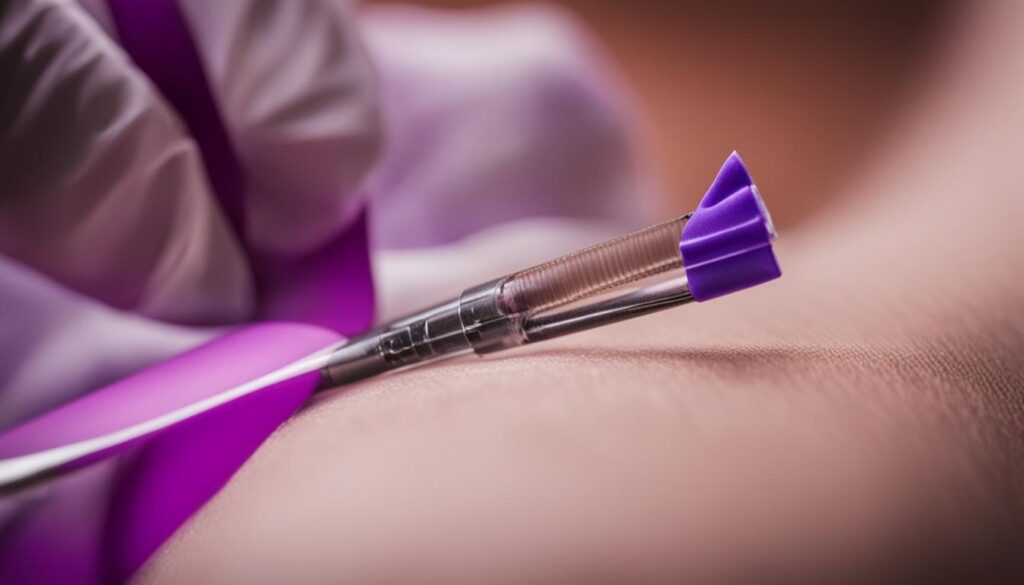Can A Person With Lupus Get A Tattoo?
 January 7, 2024 | Uncategorized
January 7, 2024 | Uncategorized
Can A Person With Lupus Get A Tattoo?
Living with lupus, an autoimmune disease, poses various challenges and questions for patients, including the safety of getting a tattoo. This article explores the effects of tattoos in patients with systemic lupus erythematosus (SLE) and their potential impact on lupus flare-ups, organ damage, and overall health.

Key Takeaways:
- Research indicates that tattoos generally do not increase the risk of lupus flare-ups or long-term complications
- Patients with lupus may require extended healing time and extra precautions for successful tattoo healing
- Consulting a healthcare professional is crucial for lupus patients considering tattoos, particularly if they have severe lupus or are taking immunosuppressants
- Understanding lupus and its impact on skin health is essential for determining the safety of tattoos
- Precautionary measures, such as choosing a reputable tattoo artist and studio, are necessary to minimize potential risks
- Proper aftercare and immediate medical consultation for potential flare-ups or infections are strongly recommended
- Knowledge and vigilance enable lupus patients to make informed decisions and enjoy a positive tattoo experience
Table of Contents
- Understanding Lupus and Its Impact on Skin Health
- Research Findings on Tattoos in Patients with Lupus
- Precautions to Ensure Safe Tattooing in Lupus Patients
- Conclusion
- Frequently Asked Questions
- Source Links
Understanding Lupus and Its Impact on Skin Health

Cutaneous lupus and systemic lupus erythematosus (SLE) are types of lupus, an autoimmune disease that can affect skin health and the healing process, potentially posing risks for those considering tattoos. Individuals with lupus may experience a range of symptoms, including skin reddening, inflammation, and lymph node swelling. Although research indicates that tattoos seem to be safe for SLE patients, it is crucial for individuals with active lupus to be informed about potential risks before getting one tattoo or even more.
Both SLE and cutaneous lupus erythematosus (CLE) affect the body’s tissues and immune response. These conditions can cause complications in terms of skin health, leading to exacerbations of chronic skin disorders and potential challenges when it comes to healing from tattoos. However, research and case studies suggest that individuals with stable lupus can safely get tattoos, as long as they take necessary precautions and consult with their healthcare providers.
“While tattoos may not directly trigger lupus flare-ups, patients with active lupus should exercise caution when considering getting inked. Informing one’s self about the potential risks and taking necessary precautions can help prevent complications.”
Though research suggests that tattoos generally do not cause severe flare-ups in SLE patients, there have been anecdotal reports of mild flare-ups and skin lesions occurring months to years after getting a tattoo. These precautionary tales may raise concerns among lupus patients; however, causation has not been firmly established.
Due to the potential risks, patients with chronic skin disorders or those experiencing active lupus should carefully weigh the pros and cons of getting a tattoo. By staying informed and considering their individual circumstances, patients can make an educated decision about whether getting a tattoo is the right choice for them.
Understanding the effects of lupus on skin health is crucial for patients considering tattoos. Those with active lupus should be aware of potential risks and communicate with their healthcare providers to ensure they make an informed decision. Following proper safety precautions can help minimize complications and allow lupus patients to express themselves through tattoos without negatively impacting their health.
Research Findings on Tattoos in Patients with Lupus
Various studies have assessed the safety and complications related to tattoos in patients with systemic lupus erythematosus (SLE). The research focuses on evaluating tattoo characteristics, immediate and long-term effects, and considering SLE-related characteristics in patients to determine the risks and possible complications associated with tattoos in SLE patients. These findings can provide valuable insights and guidance for those considering tattoos and living with lupus.
Assessing the Risk: Tattoo Safety for SLE Patients
A 2019 survey of tattooed women with systemic lupus erythematosus and women without the disease found similar tattoo characteristics across both groups. No long-term complications linked to lupus were identified, and only mild to moderate flare-ups were reported, suggesting no direct correlation with the tattoo. These findings support the general safety of tattoos in people with SLE, especially in those with inactive or low disease activity.
Immediate and Long-Term Tattoo Reactions in Lupus
Immediate and long-term effects of tattoos in lupus patients have been extensively studied. It appears that acute complications following the tattoo procedure in SLE patients are uncommon, and there is no significant increase in organ damage observed post-tattooing. Although mild-to-moderate flare-ups were occasionally recorded within a median of 9 months following the tattoo application, they highlight the need for ongoing observation of delayed immune reactions related to tattoos in lupus patients.
Interpreting the 2019 and 2023 Studies on SLE and Tattooing
The collected data from 2019 and 2023 studies provide insights into tattoos among patients with systemic lupus erythematosus (SLE). These studies report that tattoos do not pose a significant risk for lupus patients with stable conditions, with only rare instances of mild flare-ups observed. The research implies that tattoos, when done under the right conditions, may be considered safe for lupus patients. There are no significant differences in lupus characteristics between tattooed and non-tattooed SLE patients.
| Study | Findings |
|---|---|
| 2019 Survey | No long-term complications and only mild to moderate flare-ups, suggesting safety of tattoos in SLE patients |
| 2023 Study | Tattoos do not pose a significant risk for stable lupus patients, with rare instances of mild flare-ups observed |
The research on people with lupus getting tattoos indicates that they seem to be safe, as long as patients have stable conditions and follow appropriate safety guidelines. Ongoing observation of delayed immune reactions and awareness of potential risks are crucial for those living with lupus and considering a tattoo.
Precautions to Ensure Safe Tattooing in Lupus Patients
For lupus patients considering tattoos, safety remains paramount. Establishing lupus stability before getting a tattoo is crucial to minimize risk. Patients should thoroughly vet tattoo artists and studios for cleanliness and professionalism to reduce the chances of infection and complications. Aftercare requires extra attention for lupus patients with recommended prolonged wrapping and increased moisturization to aid healing. Immediate medical consultation for potential flare-ups or infections is encouraged. Precautionary measures, alongside individual consultation with healthcare providers, are essential for maintaining safety and promoting favorable outcomes of tattoos in individuals living with lupus.
Here are key safety tips for tattoos tailored to suit people with lupus:

- Consult your healthcare provider to determine the safety of tattoos for your specific condition and lupus activity before proceeding.
- Wait for a period of low or inactive lupus activity before getting a tattoo to minimize risks.
- Research and select a highly reputable, professional tattoo artist: ensure they follow strict hygiene protocols and have experience working with tattooed patients with autoimmune conditions.
- Discuss your condition with the tattoo artist to adapt their approach for enhanced tattoo and piercing safety tailored to your needs.
- Ensure the chosen tattoo studio is clean, licensed, and uses sterile equipment
- Follow strict aftercare instructions: maintain cleanliness, prolong wrapping, and moisturize more often to aid healing
- Monitor the tattoo site closely for any signs of infection, flare-up, or changes in lupus symptoms and seek medical attention immediately if necessary.
While the number of tattoos on lupus patients continues to grow, it is essential to prioritize safety and exercise caution. By following the above safety tips and consulting healthcare providers, lupus patients can maximize their chances of having a positive tattoo experience without exacerbating their condition.
Conclusion
In conclusion, while it is reasonable to assume that patients living with lupus can safely get tattoos, it is imperative to consider potential risks and follow recommended precautions. The responsibility to minimize complications falls on both the individual with lupus and the tattoo artist. Adhering to safety guidelines, such as waiting for lupus remission and maintaining a sterile tattooing environment, significantly contributes to the overall well-being of lupus patients and the successful integration of tattoos into their lives.
Summarizing the Safety and Recommendations
Research indicates that tattoos in lupus patients do not cause serious complications if proper safety measures are observed. To determine the safety of tattoos in lupus patients, healthcare professionals’ guidance is essential. When lupus is inactive or less severe, the possibility of getting a tattoo is higher, while patients who feel unwell or experience active cutaneous lupus should postpone their plans.
Final Thoughts for Lupus Patients Considering Tattoos
For those with lupus desiring a tattoo, comprehensive information from healthcare providers, along with an awareness of potential risks, is crucial to ensuring a positive experience. It is essential to monitor health conditions and consult with medical professionals to confirm that the timing for a tattoo is appropriate. Knowledge empowers lupus patients to make informed decisions that align with their health priorities and personal aesthetic preferences.
Frequently Asked Questions
Can a person with lupus get a tattoo?
Yes, individuals with lupus can get tattoos. However, it is crucial to consult with healthcare professionals before proceeding, especially if lupus is severe or if immunosuppressant medications are being taken. Ensure that lupus symptoms are stable and take extra precautions to ensure optimal tattoo healing.
What are some precautions to ensure safe tattooing for lupus patients?
Lupus patients should establish lupus stability, thoroughly vet tattoo artists and studios for cleanliness and professionalism, take extra care during the aftercare process such as prolonged wrapping and increased moisturization, and seek immediate medical consultation if potential flare-ups or infections occur. Consulting with healthcare providers before getting a tattoo is essential.
What does research say about the safety of tattoos for patients with lupus?
Research indicates that tattoos do not pose a significant risk to lupus patients with stable conditions. Studies show no increase in flare-ups or organ damage associated with tattoos. However, it is essential for patients with lupus to take the necessary precautions and consult with healthcare professionals before getting a tattoo.
What are the immediate and long-term effects of tattoos in lupus patients?
Acute complications following the tattoo procedure in SLE patients appear to be uncommon, with no significant increase in organ damage observed post-tattooing. Occasional mild-to-moderate flare-ups were recorded within a median of 9 months following the tattoo application, highlighting the need for ongoing observation of delayed immune reactions related to tattoos in lupus patients.
Can tattoos cause flare-ups in lupus patients?
Though studies report some mild to moderate flare-ups in lupus patients after getting tattoos, there is no direct correlation or significant increase in lupus-associated complications due to tattoos. It is essential for lupus patients considering tattoos to consult with healthcare professionals and take necessary precautions to minimize potential risks.
Source Links
- https://www.healthline.com/health/lupus-and-tattoos
- https://lupuscorner.com/tattoos-and-lupus-is-there-a-risk/
- https://pubmed.ncbi.nlm.nih.gov/31382852/
ABOUT

Hey there! I'm Angela,
I am a survivor of cancer, lupus, fibromyalgia, and a teenage daughter. Join me as I document my experiences and educate the world on my chronic illness journey.


